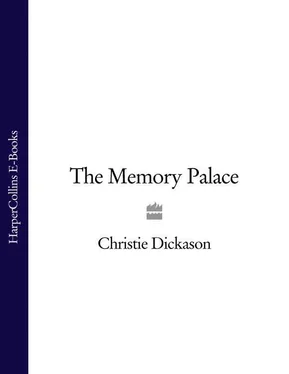Doctor Bowler began to sing quietly as if to himself.
The sun was sinking, orange as a pumpkin beyond the water meadows.
‘“To labour is the lot of Man below,”’ sang Doctor Bowler. ‘“When God gave us life, he gave us woe.”’
‘Put something flat under the feet,’ said Fox. ‘Is there anything about that we can use?’ He looked around for Wentworth, who had seemed to be the only sensible authority, but Wentworth had gone.
‘Leave the wretched thing till tomorrow!’ Harry wiped his face and jammed his tasselled handkerchief back into a slash in his sleeve. ‘We soon won’t be able to see the road back to Ufton Wharf.’ He glared at Zeal. ‘If anything is taken or harmed, I shall have you indicted for theft and wilful damage. In spite of your tame magistrate.’
If I were a man, I could call him out, thought Zeal as she watched Harry ride away up the drive, leaving Nereus abandoned on his sling. Now there’s a grand thought! Rapiers, not guns. Snick, snick, snick. Cut off his buttons. Whisht! Whisht! There go the bows from his shoes! Whisht! And a tassel from his handkerchief! And he’d never touch me. Not even close! With enough people watching such humiliation, I wouldn’t even need to draw blood.
After a quick supper at the long table in the bake house, Zeal slept in the estate office again, to be on the spot in the morning in case Harry arrived early. With John’s coat beside her, she yanked the smoky coverlet up to her chin and imagined setting her grooms on him with clubs. She would borrow Sir Richard Balhatchet’s old falconet, which he had recently had cleaned and made fit to fire.
Then she heard again the danger in Harry’s voice when he warned her against opposing him. He might be a fool, but he was a fool with powerful friends and infinite self-esteem.
Why do I care so much? she asked herself. They’re only stone!
Her feet were now cold. She crawled to the end of the makeshift bed and tucked the coverlet in again, then banged her head ferociously back into the pillow. She still did not know how to deal with the hole where a piece of her life had been excised and then declared officially never to have existed.
‘We must find a way out!’ Harry had said one night on one of his rare and brief returns from London. He wore a grim but shifty look that told her he had already decided how to get his way.
‘From our marriage?’ She dared not hope that he meant to set her free. ‘But you need an Act of Parliament to be granted a divorce!’
‘Don’t be a fool! Do you confuse me with old King Harry? I don’t have that much influence yet.’
‘But given another wife, with grander connections, you mean to get it?’ she taunted him. ‘Lady Alice, whose fortune you have not yet spent.’
But, oh, how she had snapped at his bait!
The fleck of decency in Harry’s soul, which Zeal had once mistaken for a far larger portion, was the cause, ironically, of her fall into the crime of perjury. Harry had a mutually advantageous plan. If she would collude to dissolve their marriage, he would give her Hawkridge Estate.
She rolled onto her side, then onto her back again. The ash still in the coverlet made her sneeze.
Their bargain gave him the freedom to trade Hawkridge for Covent Garden and to pursue London heiresses with larger fortunes than Zeal had ever had. It left her free to love Harry’s cousin, John Nightingale.
She turned her head to look at John’s stool and table. Then she reached out to touch the smooth polished dent at the base of one of the stool legs where he had always rested the heel of his right foot.
She would have sworn to anything.
She had sworn under oath that she had been younger than the legal age of fourteen when she and Harry were betrothed, which could well have been true. She also lied and swore that the marriage had never been consummated – for, who but Harry and she could ever prove otherwise? Particularly as the lack of issue was commonly taken as sufficient proof in such cases. Zeal’s guardian, who, by her marriage, lost all interest in either her or her fortune (now squandered by Harry, in any case), had been happy to testify that she had married against his wishes, as indeed she had. In the end, there had been almost excessive grounds for voiding the marriage and rewriting two years of her life.
As always, her head began to throb at this point. Now came the part she could consider only sideways.
Annulment meant that the marriage had never been. Therefore, if, as it had been ruled, Harry had never been her legal husband, then he had never had the right to spend her fortune. He had, nevertheless, gone through it all (and, of course, he really had been her husband all along).
Almost worse, she had never been Lady Beester, no matter what she had believed at the time. She had not had the legal right to fall in love with Hawkridge, nor to delight in its gardens or the charming irregularity of its outline or the ornate chimneys, the unexpected hens’ nests, the dusty cupboards full of other people’s lives. She had had no right to feel full and warm, as she moved about the house, her house now, aflame with domestic purpose.
Orphaned at six, she lived thereafter with relatives, with guardians or at boarding school. At Harry’s Hawkridge, she thought she had finally found her proper place on earth. She still felt as if she had missed a step in the stairs and wasn’t at all where she had thought she was, and was sick with the shock and unexpected pain.
Outside the little office window, birds were beginning to shout out their territorial claims. The sky had just begun to lighten. Not much night left. She put one of her pillows over her head to muffle the birds and tried to think how to set about building a new house.
Sir Harry and the carriers returned an hour after what would have been sun-up if the sky had not been a chilly grey. The weather, as well as erosion of novelty, led to a thinner audience than the day before. Also, the smokehouse needed tending and there was the autumn ploughing, bread to bake, the butchering of a ewe that had crippled itself, and arranging warm lodgings to see them all through the winter.
The carters brought flat stones to place under the feet of the tripod to keep them from sinking into the mud. But when the ox began to drag Nereus along the track of planks, the dolphin’s nose dug into the ground and acted as a brake.
Once she had grasped the principle of Wentworth’s method, Zeal left the men grunting and puffing in their effort to roll the old god onto his other side. Back in the office, she began to list all the different building parts she had envisioned with such delight the morning before, and the stuffs needed to make them. This morning, however, she found the work tedious.
She had imagined a house built of brick.
Therefore, I know I will need bricks. But will it be less costly to buy them or to hire men from Southampton to enlarge our own kiln? Need…dear Lord…how many thousand? How do I work it out?
I’m not sure I can do this alone, after all, she thought. Do you suppose Master Wentworth knows about houses, as well as about New World Indians?
The carters reached the forecourt. Unable to keep her mind on her great purpose, she went out to watch the final lifting of the old sea god onto the cart. On the firm footing of the forecourt the sheer legs and pulleys worked perfectly. The surrender was easily achieved by only three men.
Amphritite was next. Her fishing line had vanished during the night. As she stood on relatively dry ground, the traitorous nymph, unlike her father, yielded easily to her abductors.
‘We’ll be done by evening, after all.’ Fox sounded greatly cheered.
Zeal returned to the office. Then she had to confer with Mistress Margaret in the bake house kitchen about collecting more urine for soap making. She could not help walking back to the ponds. Unlike her sister, Panope resisted until just before dinner. After dinner, although the carters had begun to get the measure of both subjects and terrain, they shifted only Galatea, Psamanthe and the last three nymphs on the near side of the ponds. Eight more waited on the opposite banks. Harry left in a vile temper for a second night at Ufton Wharf, where the barges were moored, at his expense.
Читать дальше












